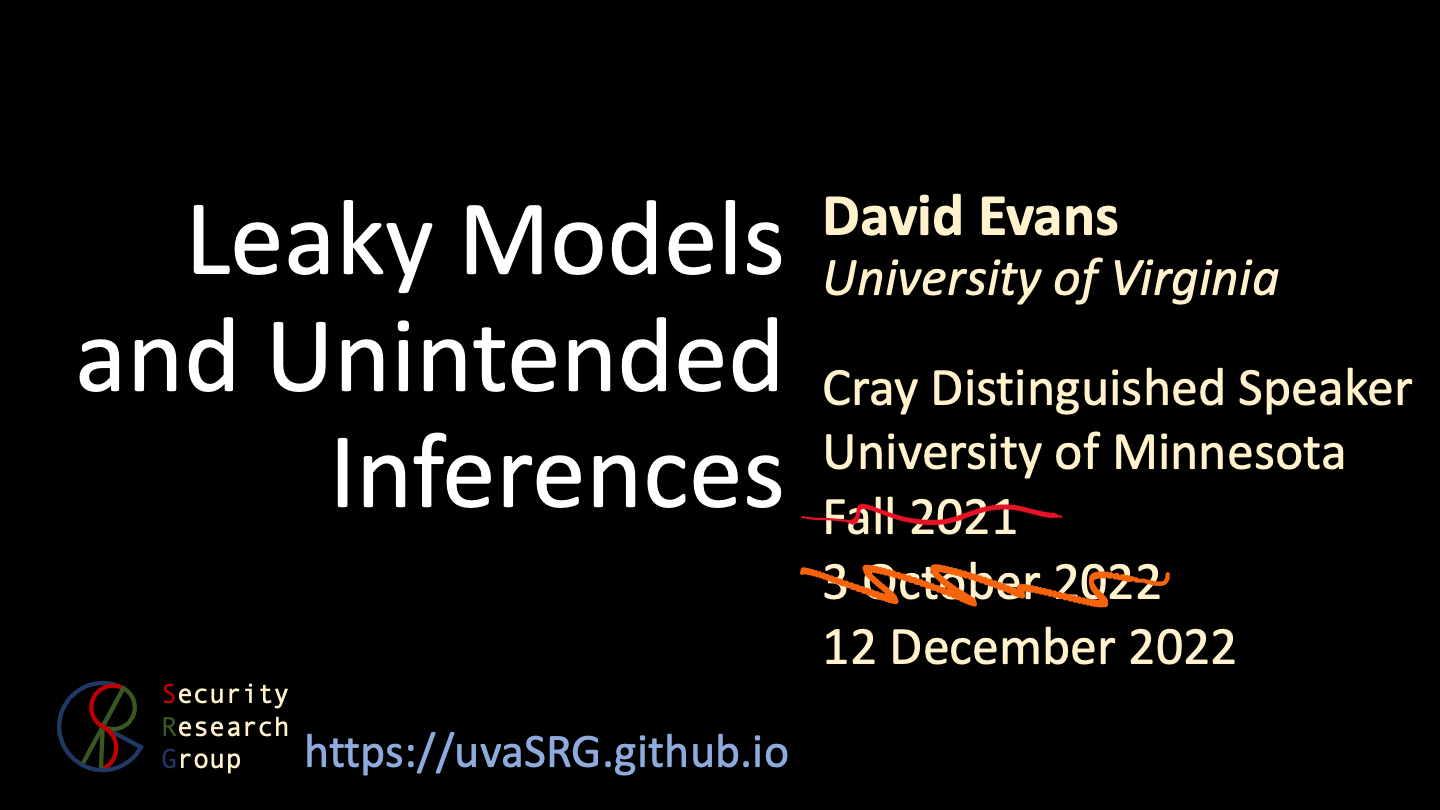David Evans, professor of computer science in the University of Virginia School of Engineering and Applied Science, is leading research to understand how machine learning models can be compromised.
ICLR DPML 2021: Inference Risks for Machine Learning
I gave an invited talk at the Distributed and Private Machine Learning (DPML) workshop at ICLR 2021 on Inference Risks for Machine Learning.
The talk mostly covers work by Bargav Jayaraman on evaluating privacy in machine learning and connecting attribute inference and imputation, and recent work by Anshuman Suri on property inference.
Codaspy 2021 Keynote: When Models Learn Too Much
Here are the slides for my talk at the 11th ACM Conference on Data and Application Security and Privacy:
The talk includes Bargav Jayaraman’s work (with Katherine Knipmeyer, Lingxiao Wang, and Quanquan Gu) on evaluating privacy in machine learning, as well as more recent work by Anshuman Suri on property inference attacks, and Bargav on attribute inference and imputation:
- Merlin, Morgan, and the Importance of Thresholds and Priors
- Evaluating Differentially Private Machine Learning in Practice
“When models learn too much. “ Dr. David Evans @UdacityDave of University of Virginia gave a keynote talk on different inference risks for machine learning models this morning at #codaspy21 pic.twitter.com/KVgFoUA6sa
CrySP Talk: When Models Learn Too Much
I gave a talk on When Models Learn Too Much at the University of Waterloo (virtually) in the CrySP Speaker Series on Privacy (29 March 2021):
Abstract Statistical machine learning uses training data to produce models that capture patterns in that data. When models are trained on private data, such as medical records or personal emails, there is a risk that those models not only learn the hoped-for patterns, but will also learn and expose sensitive information about their training data. Several different types of inference attacks on machine learning models have been found, and methods have been proposed to mitigate the risks of exposing sensitive aspects of training data. Differential privacy provides formal guarantees bounding certain types of inference risk, but, at least with state-of-the-art methods, providing substantive differential privacy guarantees requires adding so much noise to the training process for complex models that the resulting models are useless. Experimental evidence, however, suggests that inference attacks have limited power, and in many cases a very small amount of privacy noise seems to be enough to defuse inference attacks. In this talk, I will give an overview of a variety of different inference risks for machine learning models, talk about strategies for evaluating model inference risks, and report on some experiments by our research group to better understand the power of inference attacks in more realistic settings, and explore some broader the connections between privacy, fairness, and adversarial robustness.
Virginia Consumer Data Protection Act
Josephine Lamp presented on the new data privacy law that is pending in Virginia (it still needs a few steps including expected signing by governor, but likely to go into effect Jan 1, 2023): Slides (PDF)
This article provides a summary of the law: Virginia Passes Consumer Privacy Law; Other States May Follow, National Law Review, 17 February 2021.
The law itself is here: SB 1392: Consumer Data Protection Act
